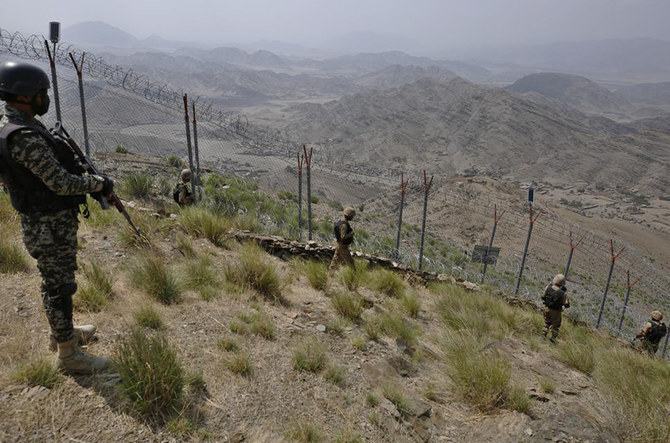PESHAWAR: Pakistan in rare airstrikes targeted multiple suspected hideouts of the Pakistani Taliban inside neighboring Afghanistan on Tuesday, dismantling a training facility and killing some insurgents, four security officials said.
The strikes were carried out in a mountainous area in Paktika province bordering Pakistan, said the officials. They spoke on the condition of anonymity because they were not authorized to speak to the media on the record. It was unclear whether the jets went deep inside Afghanistan, and how the strikes were launched.
No spokesman for Pakistan’s military was immediately available to share further details. But it was the second such attack on alleged hideouts of the Pakistani Taliban since March, when Pakistan said intelligence-based strikes took place in the border regions inside Afghanistan.
In Kabul, the Afghan Defense Ministry condemned the airstrikes by Pakistan, saying the bombing targeted civilians, including women and children.
It said that most of the victims were refugees from the Waziristan region.
“The Islamic Emirate of Afghanistan considers this a brutal act against all international principles and blatant aggression and strongly condemns it,” the ministry said.
Local residents said at least eight people, including women and children, were killed in the airstrikes by Pakistan. They said the death toll from the strikes may rise.
In a post on the X platform, the Afghan defense ministry said the Pakistani side should know that such unilateral measures are not a solution to any problem.
“The Islamic Emirate will not leave this cowardly act unanswered but rather considers the defense of its territory and territory to be its inalienable right.”
The strikes came hours after Mohammad Sadiq, Pakistan’s special representative for Afghanistan, traveled to Kabul to discuss a range of issues, including how to enhance bilateral trade, and improve ties.
Sadiq during the visit met with Sirajuddin Haqqani, Afghanistan’s acting interior minister, to offer his condolences over the Dec. 11 killing of his uncle Khalil Haqqani. He was the minister for refugees and repatriation who died in a suicide bombing that was claimed by a regional affiliate of the Daesh group.
Sadiq in a post on X said he also met with Foreign Minister Amir Khan Muttaqi and he “held wide ranging discussions. Agreed to work together to further strengthen bilateral cooperation as well as for peace and progress in the region.”
A delegation of the pro-Taliban Jamiat-e-Ulema Islam also visited Kabul on Tuesday to convey condolences over the killing of Haqqani’s uncle.
Islamabad often claims that the Pakistani Taliban use Afghan soil to launch attacks in Pakistan, a charge Kabul has denied.
Syed Muhammad Ali, an Islamabad-based security expert, said Tuesday’s airstrike “represents a clear and blunt warning to Pakistani Taliban that Pakistan will use all the available means against the terrorist outfit both inside and outside its borders.” However, it is not an indiscriminate use of force and due care was taken by Pakistan in ensuring that only the terrorist bases were hit and no civilian loss of life and property took place, he said.
The Afghan Taliban seized power in Afghanistan in 2021 and the Taliban takeover in Afghanistan has emboldened the Pakistani Taliban, known as Tehreek-e-Taliban Pakistan, whose leaders and fighters are hiding in Afghanistan.
The TTP has stepped up attacks on Pakistani soldiers and police since November 2022, when it unilaterally ended a ceasefire with the government after the failure of months of talks hosted by Afghanistan’s government in Kabul. The TTP in recent months has killed and wounded dozens of soldiers in attacks inside the country.
Pakistan airstrikes target suspected TTP militant hideouts in Afghanistan
https://arab.news/zazt3
Pakistan airstrikes target suspected TTP militant hideouts in Afghanistan

- Strikes carried out in mountainous area in Paktika province bordering Pakistan, training facility dismantled, insurgents killed
- Afghan Defense Ministry condemns airstrikes by Pakistan, saying they targeted civilians, including women and children
Amroti ‘Water’ Mosque: Century-old symbol of faith and resistance in southern Pakistan

- Mosque was built around 1890 under guidance of Syed Taj Mahmood Shah Amroti, first translator of Qur’an into Sindhi language
- Mosque’s location became problem when British wanted to built Sukkur Barrage but resistance by Amroti and followers forced retreat
SHIKARPUR, Sindh: Standing on seven pillars in the middle of the Kirthar Canal, a unique mosque in Pakistan’s southern Shikarpur district is more than just a place of worship — it is a symbol of defiance and resistance against British colonial rule.
With its whitewashed walls rising above the flowing waters, the Amroti Mosque’s architecture is as unique as its story.
The mosque was first constructed from mud, wood and palm tree trunks on a mound around 1890 under the guidance of scholar and educationalist Syed Taj Mahmood Shah Amroti, who was the first to translate the Holy Qur’an into the Sindhi landguage and provide detailed explanations of its teachings. For years, the mosque served as a place of workshop for the residents of Junejo village in Shikarpur until its location became an issue when the British colonial rulers of India decided to build the Sukkur Barrage and its canals, ordering the demolition of the masjid.
Historical accounts say Amroti sent over 20 letters to authorities asking to change the canal’s route but received no response and the British eventually issued a warrant for his arrest.
“In 1922, the British government started the Kirthar Canal project to irrigate uncultivated lands of Sindh and Balochistan [provinces],” Sayed Rushdullah Shah Amroti, the administrator of Amroti Mosque and the great grandson of Amroti, told Arab News.
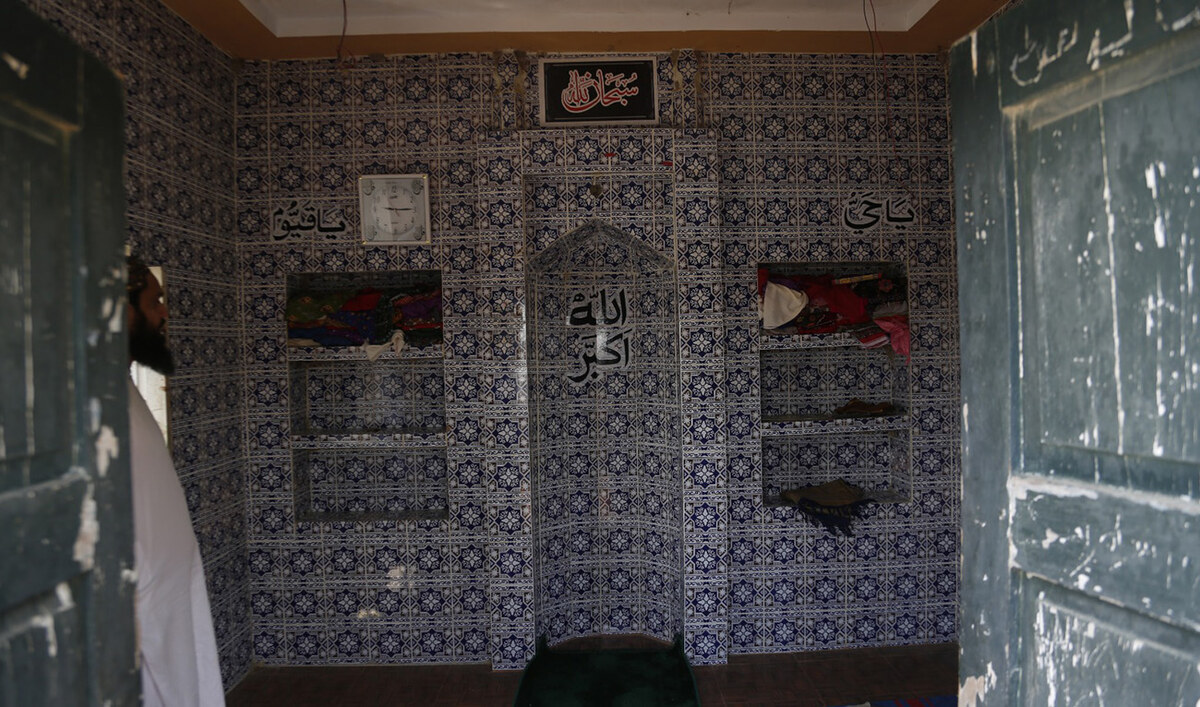
“When Hazrat Amroti came to know that the British government wanted to demolish the mosque, he decided to camp here and offered stiff resistance to British authorities.”
When British officials arrived with machines to demolish the mosque, local villagers joined Amroti in a massive protest. In the end, the British agreed not to destroy the mosque and instead promised to strengthen its structure so that both the mosque and the canal could remain.
“The impact of the resistance was that the British government was forced to kneel down,” Sayed said. “They left the mosque as it was and made the canal around its four sides.”
The mosque in its present shape was subsequently built, serving as a reminder of the importance of both faith and rebellion as it stood amid the waters of the Kirthar Canal, which originates from the Indus River at Sukkur Barrage and became operational in 1932 as a vital watercourse for Balochistan, particularly districts like Jafarabad and Naseerabad.
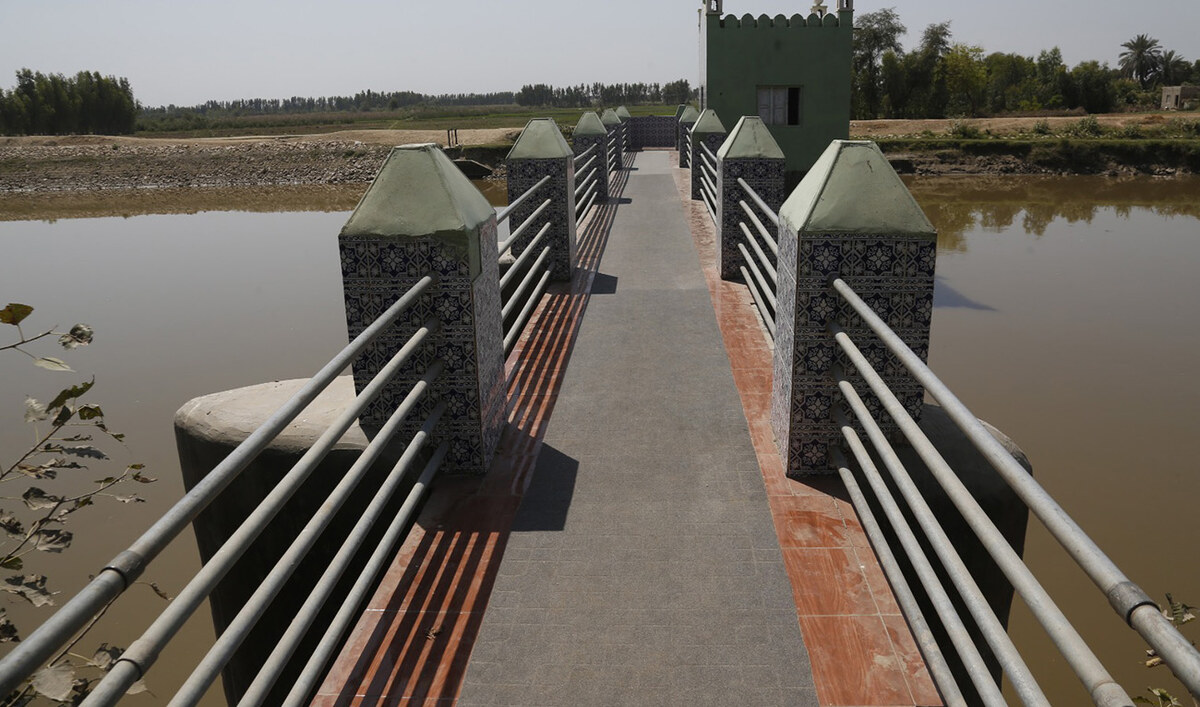
“STRANGE SPIRITUAL STATE”
In the past, residents would use boats to reach Amroti Mosque for prayers but after independence from British rule in 1947 and the creation of the two separate nations of Pakistan and India, the government rebuilt a proper structure for the mosque, constructed a bridge for easier access and ensured that water continued to flow beneath it.
Though the small mosque only allows 10-12 people to pray at a time, it holds great cultural and spiritual value for the people of the area.
“We are very proud of the religious and Islamic achievements of our ancestors, and wherever we go in the world, the respect we receive because of our connection to Amroti Sharif is largely due to the role of this mosque,” Rushdullah said.
Nasim Bukhari, a local writer, described the mosque as a “great symbol of resistance in history.”

“And this has been the history of Sindh, that we have never accepted defeat. Even if we had to face defeat, we would die with our names still alive. We never ran away,” he said.
Amroti’s struggle was part of a larger resistance movement in Sindh, according to Bukhari.
“Syed Taj Mahmood Amroti fought against the British in his time and became a symbol of resistance. The people of that time, unarmed, fought with perseverance,” the author said, highlighting Amroti as an inspiration for others. One of his disciples, Syed Salah Aajiz Memon, later became the first Sindhi and Muslim figure against whom the British filed a case for rebellion.
“The name and deeds of our leader, Syed Taj Mahmood Amroti, have had their impact, but the resistance movement led by his followers and disciples also carries a remarkable legacy,” Bukhari said.

To date, the mosque continues to serve as a place of deep spirituality and worshippers describe a “profound sense of peace” at the place, especially when the water runs high and the mosque appears to be floating in the canal.
“While praying here, a strange spiritual state occurs,” Maulana Shahnawaz Baloch, the prayer leader at the mosque, told Arab News.
“At this time, the water level is low, yet there is still a spiritual atmosphere. When the water level is higher due to the season, a completely different spiritual experience takes place.”
Pakistan warns Afghan Citizen Card holders of legal action as expulsion deadline expires

- Pakistan issued a Mar. 31 deadline for ACC holders to return voluntarily to Afghanistan
- Since 2023, state-run media says Pakistan has deported around 886,000 Afghan nationals
ISLAMABAD: Pakistan’s state broadcaster on Wednesday warned Afghan Citizen Card holders and “illegal foreigners” of strict legal action as the deadline for them to return to their countries voluntarily expired this week.
Islamabad last month announced a deadline of Mar. 31 for Afghans in Pakistan holding ACCs, a certain immigration document, to leave the country. The move was part of Pakistan’s larger drive to expel what it says are illegal immigrants from the country.
Pakistani authorities maintain Afghan nationals have been involved in militant attacks and organized crime, accusations Kabul denies. Islamabad’s decision to hasten the expulsion of Afghans holding ACCs has coincided with the Eid Al-Fitr celebrations, casting a shadow over the religious holiday for thousands of Afghan families.
“Strict legal action will be initiated against the illegal foreigners and Afghan Citizen Card holders as the deadline given to them to leave the country has expired,” state broadcaster Radio Pakistan said.
It added that the process of repatriation of Afghan nationals to their country is continuing.
“As of now, the total number of returnees stands at around 886,000,” the state broadcaster said.
ACCs were issued by Pakistani authorities and are held by 800,000 Afghans, according to the United Nations.
More than 1.3 million Afghans who hold Proof of Registration (PoR) cards from the UN refugee agency, UNHCR, are also to be moved outside the capital Islamabad and the neighboring city of Rawalpindi.
The UN says nearly three million Afghans live in Pakistan, many having fled there over decades of war in their country and after the return of the Taliban to power in Afghanistan.
Pakistan kicked off its deportation drive in 2023 amid a surge in violence by armed groups like the Tehreek-e-Taliban Pakistan (TTP) and the Baloch Liberation Army (BLA), whose leaders Islamabad claims are based in Afghanistan, a charge rejected by the Taliban administration.
The move has further soured Islamabad’s ties with Kabul. Afghanistan’s Refugees Minister Mawlavi Abdul Kabir on Tuesday requested Pakistan to halt the deportations and allow Afghans to return to their country voluntarily.
“He emphasized the importance of humane treatment for refugees, especially in light of reports of mistreatment of Afghans by border nations, including instances where individuals holding legal visas were also deported,” Afghan state news agency Bakhtar said.
International rights groups have also urged Islamabad to halt the deportations, warning that some returning Afghans could face threats under Taliban rule.
Pakistan insists it is carrying out the deportation campaign in a humane manner, saying it respects the dignity of all Afghan nationals.
In Pakistan’s Shikarpur, an arms dealer by trade and storyteller at heart

- Agha Sanaullah Khan, 76, has sold weapons since 1090s at Pathan Armory in historic Shikarpur city
- He has authored four Sindhi language travelogues and collection of short stories called ‘Ghalti’, or ‘Mistake’
SHIKARPUR, Sindh: Agha Sanaullah Khan, a 76-year-old arms dealer, sat last month in front of piles of books, with assault rifles, pistols and other ammunition and weapons’ accessories stacked up around them at his shop in the southern Pakistani city of Shikarpur.
Is this a bookstore or an arms dealership?
Welcome to Pathan Armory near Lakhi Dar, one of the seven gates of the historic Shikarpur city, where Khan has been selling weapons for over three decades.
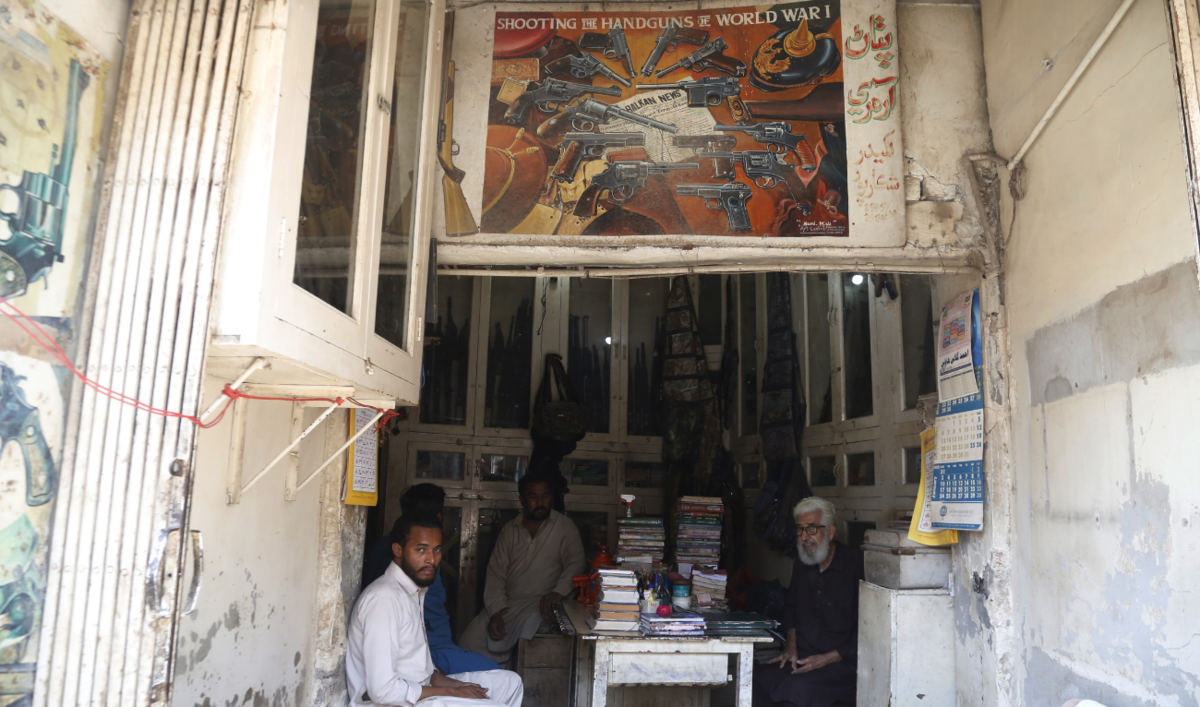
But his true passion lies somewhere else: in writing short stories and travelogues.
The septuagenarian, who has authored four Sindhi language travelogues, and a collection of short stories called ‘Ghalti’, or ‘Mistake,’ says customers who visit his armory are often surprised when they find him pouring over books.
“They come and say, ‘Weapons and books both?’,” Khan said, as he counted change for a customer. “What can I do? Whenever I get free, I read. One should read. Not just reading, I also write here, sir. I sit here and write. This is my nature.”
“Weapons are my business, my livelihood, and I earn from it. I support myself with it,” he explained. “Books are my passion.”
“PASSION FOR TRAVEL”
Khan, whose father was a bureaucrat, set up his armory in the early 1990s in Shikarpur where he lives with his wife while his children are settled in the United states.
The city, which from the 17th to 19th centuries used to be a vital trade hub connecting Central Asia and the Indian Sub-continent, is now plagued by a major crime problem, with several dacoit gangs operating in riverine areas of the district.
Nasir Aftab, Deputy Inspector General of Police (DIGP) Larkana Range, told Arab News the security situation in Shikarpur had improved due to ongoing armed operations against dacoits.
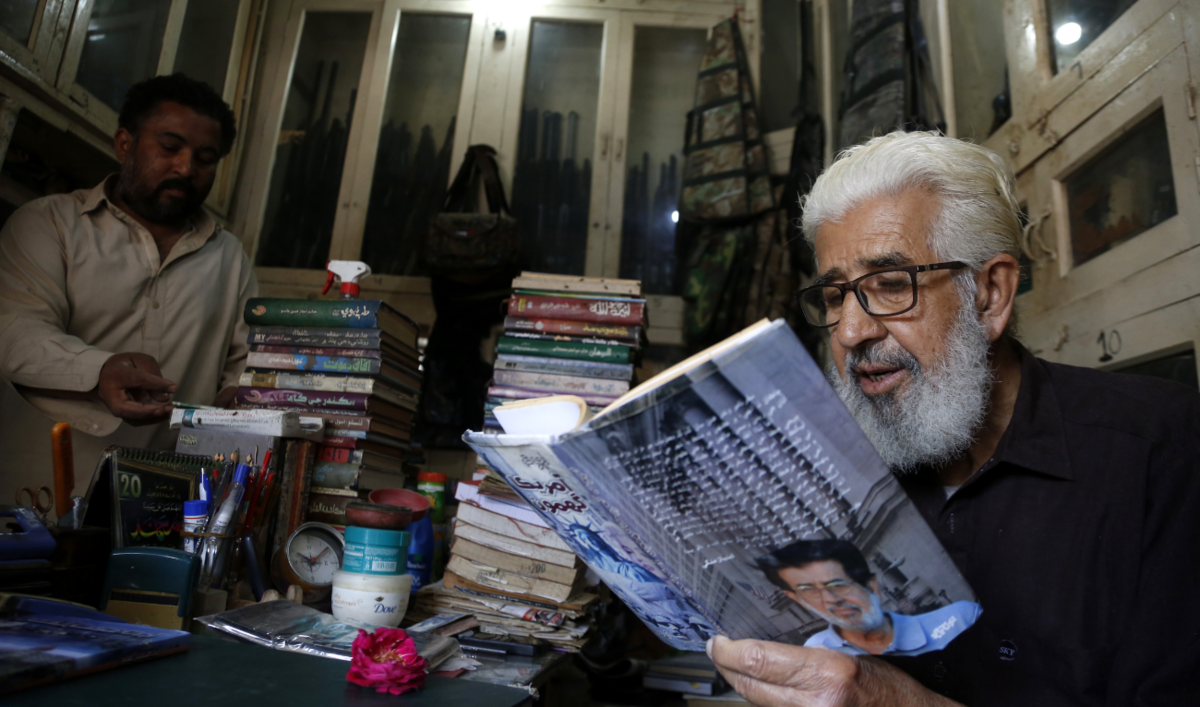
“The operation has weakened the organized criminal network, leading to a drastic improvement in security in the region,” Aftab said. “Public confidence has been restored, and the dacoits are finding it difficult to regroup. With continued law enforcement efforts, lasting peace and security in Shikarpur, Kashmore, and surrounding areas is becoming a reality.”
But for Khan, weapons and pistols were “a necessity now.”
“The law-and-order situation here is such that people are forced to keep guns. And it is allowed by the government, I have the license.”
The arms dealer’s heart, however, lies in storytelling and his passion for travel writing is inspired by a love for tourism.
In his books, he has documented his journeys from the bustling streets of India and the serene landscapes of Nepal to the vibrant markets of Thailand and sprawling cities of the United States.
“When I was born, I had a passion for tourism. When I became wise, I thought I should travel,” he said. “I came into the [arms] business but touring remained stuck in my mind.”
The septuagenarian says his travels to India with friends, which he has written about in his first travelogue, were particularly impactful, as he was able to reconnect with migrants from Shikarpur and experience their hospitality and shared history.
“I met with someone who had migrated from here, Guman Punjabi from Shikarpur. He served me greatly. I met many other migrants and they treated me well,” Khan recalled.
His fascination with America, where his two sons and two daughters live, has led him to write two travelogues while a third one is in the works.
“You can say that I have traveled all over the country, New York, Washington and all major cities of Florida state,” he said, adding that he considered America his second home, but chose life in his hometown of Shikarpur over procuring an American nationality.
Khan, who wants to inculcate a love for reading and writing in others, recently donated nearly 4,000 books to a local library on a friend’s request.
He now wishes to leave behind a legacy that is rooted in his passion for words.
“At present, people know me as an arms dealer,” said Khan as he polished an assault rifle, “but I want that a time comes when people know me more as a travelogue writer.”
International Association of Women Police selects Pakistan’s Ayesha Butt for global award

- Butt, who is a city traffic officer in Gujranwala, is scheduled to receive award at IAWP conference in Glasgow in September
- Pakistani woman cop awarded for her “distinguished service and commitment to policing,” says IAWP President Julia Jaeger
ISLAMABAD: The International Association of Women Police (IAWP) has selected Pakistan’s Ayesha Butt for its global ‘Excellence in Performance Award 2025,’ Punjab Police announced on Wednesday, describing the development as a “source of pride” for the country.
The IAWP is an international organization with over 70 countries and 30 affiliate organizations as its members. The IAWP says its mission is to strengthen, unite and raise the capacity of women in policing internationally. It provides critical opportunities for women in training, mentoring, collaboration and networking.
Butt currently serves as city traffic officer in Pakistan’s eastern city of Gujranwala at the rank of superintendent of police (SP).
“I am writing to inform you that you are selected to receive the 2025 International Association of Women Police Excellence in Performance Award,” Julia Jaeger, IAWA president, wrote in a letter shared by Punjab Police on Wednesday.
“The IAWP is proud to honor your distinguished service and commitment to policing. On behalf of our members, the Board of Directors and the Recognition Committee, congratulations on receiving the highly competitive global recognition,” she added.
Jaeger wrote that Butt would be presented with the award at the IAWP’s 62nd annual conference scheduled to be held in Glasgow in September this year.
“We sincerely hope you can attend and receive your award in person,” Jaeger wrote.
Separately, Punjab Police praised Butt for winning the award in a press release.
“Inspector General Punjab Dr. Usman Anwar congratulates SP Ayesha Butt on making the police department’s name shine,” Punjab Police said.
“SP Ayesha Butt’s success is a source of pride for all police officers, especially women officers,” Anwar was quoted as saying by the police.
The achievement is a significant one for Pakistan, where women often lack family and societal support in pursuing careers in law enforcement.
Pakistan president hospitalized, health ‘improving,’ aide says

- Asif Ali Zardari was hospitalized in Karachi on Tuesday after suffering from fever and infection, media reports say
- Reports of Zardari being shifted to Dubai for treatment are “inaccurate,” clarifies Sindh minister Sharjeel Memon
KARACHI: President Asif Ali Zardari’s health is improving and he will be fine “soon,” his close aide and Sindh minister Sharjeel Inam Memon said this week, following media reports of the president being hospitalized in Karachi.
Zardari was brought to a hospital in Karachi from Sindh’s Nawabshah city on Tuesday after he complained about suffering from fever and an infection, local media outlets reported.
The president is also the co-chairman of the Pakistan Peoples Party (PPP), a key member of Prime Minister Shehbaz Sharif’s ruling coalition government. Neither the PPP nor the presidency have commented on Zardari’s health so far.
“The reports about President Asif Ali Zardari being shifted to Dubai for treatment are inaccurate,” Memon wrote on social media platform X on Tuesday.
“His health is improving and Inshallah he will be fine very soon,” he added.
In a statement released from the Prime Minister’s Office (PMO) on Tuesday, Sharif contacted Zardari to inquire about his health and pray for the president’s speedy recovery.
“The entire nation’s prayers are with you,” Sharif was quoted as saying by the PMO.
Zardari, who is the widower of Pakistan’s slain first woman prime minister Benazir Bhutto, was appointed president for a second term in March last year. He previously served as president of Pakistan from 2008-2013.
A landowner from Sindh, Zardari rose to prominence after his marriage to Bhutto in 1987. He was widely criticized for corruption scandals that led to the collapse of Bhutto’s government in 1990.


